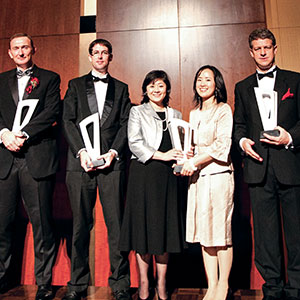The Group of Seven (G7) comprises Canada, France, Germany, Italy, Japan, the US and the UK: the countries reported to be the world’s major economies according to the International Monetary Fund. They represent 46% of global GDP.
The 42nd G7 Summit will be held on 26–27 May at Ise-shima in Mie Prefecture. Other ministerial meetings focusing on specific policy areas are being held in various locations nationwide throughout the year.
The background of the G7 lies in the Group of Six, which was founded ad hoc in 1975 when Valéry Giscard d’Estaing, then-president of France, invited finance ministers and central bank governors from six countries to the Château de Rambouillet near Paris. Representatives had informal discussions on world issues. Canada became the seventh member of the group in 1976.
Global concern
The 2016 summit meets at a time of growing uncertainty in the global economy, affected by a range of factors including a slowdown in emerging markets, a sharp drop in oil prices and weakening trade.
At Ise-shima, the leaders are expected to deliver a positive message to address challenges to global economic growth. Foreign policy issues will also be on the table. These include counter-terrorism, and issues in the Middle East, Ukraine and North Korea.
In December 2015, the United Nations Climate Change Conference (COP21) adopted the Paris Agreement to replace the Kyoto Protocol. Japan’s commitment to increase its assistance to developing countries to ¥1.3trn in 2020 helped pave the way to reaching the agreement. The G7 will discuss how to build on COP21.
Ensuring energy security remains a major concern, so leaders at the G7 are expected to play a role in addressing energy policy.
The summit will be the first meeting of the G7 since the adoption of the 2030 Agenda for Sustainable Development, at the heart of which are Sustainable Development Goals. The G7 will need to take a proactive leadership role in this work; a global partnership that includes a range of stakeholders will be essential in implementing the agenda.
Support for Africa
In August, Japan—with the United Nations, United Nations Development Programme, World Bank and African Union Commission—will hold the Sixth Tokyo International Conference on African Development, in Kenya. Japan sees this as an opportunity for the international community as a whole to discuss development in the region. It aims to secure the cooperation of the G7 in the work.
Infrastructure and health
Also on the agenda in Ise-shima will be the issue of quality infrastructure investment. There is a global demand–supply gap in infrastructure investment, which reportedly amounts to around ¥108.9trn a year.
For many years Japan has promoted quality infrastructure investment around the world. In May 2015, Prime Minister Shinzo Abe announced the Partnership for Quality Infrastructure. At Ise-shima, the leaders will discuss possible contributions by the G7.
This year, as in previous years, health issues will be firmly on the table. In 2000, at the 26th G8 Summit in Okinawa Prefecture, the fight against infectious diseases was the major agenda item. Discussion led to the establishment of the Global Fund: a partnership aiming to accelerate the end of AIDS, tuberculosis and malaria as epidemics.
Eight years later, at the 34th G8 Summit in Hokkaido Prefecture, leaders agreed on the importance of comprehensive approaches to strengthen health systems. Agreement included the scaling up of programmes to control infectious diseases, and the improvement of maternal, newborn and child health.
In 2016, the G7 will consider strengthening the response to public health emergencies, taking into account the lessons learned from previous outbreaks of disease, such as Ebola. Additionally, they will discuss ensuring the provision of lifelong healthcare services, from maternal, newborn and child healthcare to non-communicable diseases and ageing, in the pursuit of universal health coverage.
Empowering women
Building on progress made in 2015 at the 41st G7 Summit in Bavaria, Germany, several issues with specific relevance to women will also be on the Ise-shima agenda.
These will include empowering women through education, promoting greater engagement in natural sciences and technology, and accelerating the international momentum for women to take on greater roles in a wider range of areas.
The Ise-shima summit has a full and extensive agenda—and the eyes of the world’s media will be on the leaders attending.






